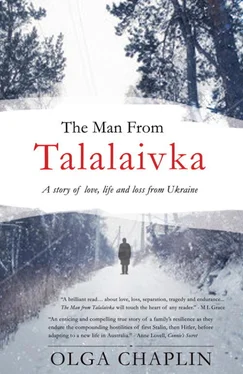He peered into the semi-light. Two powerful engines at the front of their next transport train awaited them, their markings distinct: ‘Reich Wehrmacht Transport’. His heart sank. Wherever they were being taken, the next part of their forced journey would be faster, and further from their homeland. “They must be desperate for labourers, to take us so far… wherever it is,” he thought. He spared Evdokia the heartache as, tending to the children, she was unaware of this.
As he stepped across the rough platform, his boots heavy, thumping the damp soil like a slowing heartbeat as he walked, he realised, at that moment, that his footsteps were feeling his Ukrainian soil for the last time before being taken to foreign lands. An almost overwhelming sense of grief hit him. He did not know when he would return to his Ukraine, to the life that had meant everything to him. And Vanya’s last image came to him. Tears stung his tired eyes. He had nowhere to turn to, to contain his sorrow. Nausea gripped him. He looked at Evdokia, so dependent and trusting, and at Nadia and Mykola. He swallowed hard, somehow controlling himself. He had to stay strong for them, whatever lay ahead.
* * *
With Drohobych behind them, a new confidence pulsated from the armed guards as they signalled with their rifles for their captives to take water from huge milk urns. The massive engines now powered almost effortlessly northwest through acquiescent Poland. Peter steeled himself, sensing they still had far to travel. He gazed intently at the passing meadows and forests, looking for changes that would indicate their location. Significant railway junctions now had duplicated German signs. Four long years of German occupation of these lands had stripped its people, rendered them harmless in Reich hands. He closed his eyes, exhausted. The late morning sun warmed his face as it pressed, unconscious, against the window pane.
At a change of pace, the train eased to a stop. Peter jerked awake, familiarising himself with the surroundings. They had stopped at a country station, with no signage. Nearby, cottages with curtains drawn, hid their mute occupants. Soldiers, astride army trucks, waited stiffly as their officers approached the train.
The carriage door flew open, startling the dozing prisoners. The SS officers moved slowly, deliberately, through the carriage without speaking, eyed each prisoner carefully. Peter’s stomach felt a sickening bolt as he guessed their purpose. “My God!” he suppressed a gasp. “They’re searching for more Jewish people!” He forced himself to stay calm, glanced surreptitiously through half-closed eyes beyond the ghost-town houses.
In the far distance, and almost out of view to the unwary, he could see the barbed wire fence of a concentration camp, its furnace stacks almost obscured by the trees. He had heard rumours of Hitler and Himmler’s extermination camps, most of them in Poland. But he had hoped—prayed—that these rumours were part of Stalin’s anti-Nazi propaganda. A wave of revulsion hit him. He closed his eyes, willing himself not to react, pretended he was dozing. He could not risk revealing his true feelings at that moment. Hitler’s SS men did not need to justify who they singled out for the waiting trucks. The SS officer stood over them, eyed him and his blonde-haired family coldly, then moved on in his inspection.
* * *
In the dead of night German military efficiency brought them to the outskirts of Berlin. Their prison train crept along the tracks, its large front lights dimmed deep blue. Above, and about them, the night sky lit up, as if daylight had hit them. The explosions sent raining shards of light and colour, as if in celebration of a great event. Peter pulled back from the flashing window, could not believe his eyes. The fireball in the night sky was deadly, yet spectacular. He comforted Evdokia and the children, reasoned these explosions were farther than they seemed, and prayed to his Maker that he guessed right. With every carriage door locked, the train would become a molten tunnel, with no means of escape.
Suddenly, more soldiers rushed into the darkened carriage, relieving the guards. An officer yelled commands to the new patrol: water cans, sacks of foodstuffs dumped at the door, then the door locked again. Peter sensed the extreme urgency. If Berlin had been their final destination, then the scaled-up Allied night bombings must have forced a fast change of plans.
The commanding officer shouted his final order for the train to move. It jerked forward, almost recklessly, its great engines forced into faster gears. In the flashing semi-darkness, lit up by the spectacle of the Allies’ bombs, and the orange-red hurricane of fire left below in their wake, Peter could smell the adrenaline-fuelled panic. Their captors were taking them westward again, from one inferno to another. Now, they would be even closer to Allied territory and the unrelenting bombing raids. It would take more than a miracle, now, to survive such a barrage of firestorms and bombs. Peter, deep in his soul, did not believe in miracles.

Chapter 27
At precisely the moment the Allied night bombers emptied their deadly cargo and swooped their retreat out of range of German anti-aircraft fire, a shrieking signal pierced the morbid silence. Like clockwork, German soldiers flung open the carriage doors, shouting orders as they flashed their torches through the darkened carriages.
“Bewegen! Schnell, schnell! Bewegen!” The tension was palpable. There was insufficient time to transfer these prisoners from train to trucks, to reach the labour camp before the next onslaught of Halifax and Lancaster bombers returned, within reach of Berlin and this fringe forest.
In strategic formation, the trucks were already lined up alongside the carriages at this unmarked railway siding, the dim coal-red glow of the sky burnishing a deceptive warmth over the silhouetted trucks, with back supports unhinged, awaiting their human cargo.
Peter sensed the soldiers’ pent-up agitation; he, too, felt the oppressive danger. His nostrils flinched. Even in the chill of night, he could smell the strange mix of sweat and adrenalin of their tensed bodies as they ran through the carriages, could see their twitching jugular veins as they repeatedly shouted orders to evacuate the train. The Allied bombers would return too soon, aim again and again at these vital railway lines and other installations in unrelenting nightly missions to disrupt German war production, their ultimate goal to paralyse the enemy.
“We all want to live,” he thought with a pang, in spite of the incongruity of the situation. “And they’re so young… they, too, are afraid of dying.”
He gripped Mykola’s arms, lifted him into the waiting truck, then little Nadia and Evdokia. Captors, prisoners: all were vulnerable, so close to the railway line. He stood astride, arms outstretched, locking his little family to him. The truck jerked, preparing to move.
As each truck was hurriedly loaded with its human transport and each back support locked, it joined the convoy that was already weaving its way in the dark. Like a night creature with its red bulbous eyes glowing back at the following truck, front lights turned off, the procession of prisoners headed to its hidden destination.
As the convoy wove through the dark, from sealed to gravelled road, Peter smelled the vegetation brushing against the truck on the narrowing road, glimpsed trees that reached higher and higher until, it seemed, the forest had become a canopy protecting them from the bombs and fires of Berlin. He peered into the night, heard the clanging of locks on wire gates. The truck edged forward, motor throttled to idle, waiting its turn. At that moment, he heard the hum. He looked up to the night sky in the direction of Berlin and could just make out, through the gap of the open camp gates, the red glow of burning buildings, scattered around Berlin.
Читать дальше













